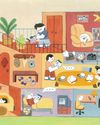
A FEW YEARS AGO, I accidentally midwifed a death. She was an elderly woman who had lived alone for many years, and though her death should, on some level, have been expected, it came as a shock to me. Her name was Agatha, but she told me once that she’d had another name given to her by her grandfather because Agatha was an old family name and had already belonged to too many people.
At Agatha’s funeral, I would learn what her secret name was, and it would make me sad because, the whole time she was dying, I was calling out the name I knew. She was getting further and further away, and it wasn’t that I thought she would come back but just that I wanted her to know I was still there. But I was calling her by the name that had already been worn out when it reached her.
FOR A WHILE, I volunteered at a seniors’ centre where most of the clients had dementia. I became very fond of a woman named Marjorie, who was in her nineties but was more alive than most people I knew. Marjorie was convinced that we’d been schoolmates. “Chummed around together” was how she put it. I’d get her to tell me stories and then, the next time I saw her, I’d remind her of things we had done together when we were both at boarding school in Rothesay, New Brunswick. Sometimes we would talk about what it had been like at McGill just after the war. The larks we’d gotten up to. It was all lies, of course. But it was also true.
This story is from the July/August 2020 edition of The Walrus.
Start your 7-day Magzter GOLD free trial to access thousands of curated premium stories, and 8,500+ magazines and newspapers.
Already a subscriber ? Sign In
This story is from the July/August 2020 edition of The Walrus.
Start your 7-day Magzter GOLD free trial to access thousands of curated premium stories, and 8,500+ magazines and newspapers.
Already a subscriber? Sign In

Invisible Lives
Without immigration status, Canada's undocumented youth stay in the shadows

My Guilty Pleasure
"The late nights are mine alone, and I'll spend them however I damn well please"

Vaclav Smil Is Fed Up
The acclaimed environmental scientist is criticizing climate activists, shunning media, and stepping back just when we need him most

It's Time for a Birth Control Revolution
What the pill teaches us about the failure - and future - of women's health care

Would You Watch a Play about Hydro Electricity?
How documentary theatre struck a chord in Quebec

Still Spinning
One record chain has bet big on a new appetite for physical media

Just So You Know, I Love My Mother
In many ways, multi-generational living makes sense. But that doesn't make it easy

Art of the Steal
Why are plundered African artifacts still in Western museums?

Canada in the Middle
What role can we play in easing the war in Gaza?
Canadian Multiculturalism: A Work in Progress
As we mark fifty years since the adoption of Canada’s federal multiculturalism policy, human rights advocate AMIRA ELGHAWABY celebrates its merits and reflects on the work that is yet to be done when it comes to inclusion, acceptance, and fighting systemic racism in our country.